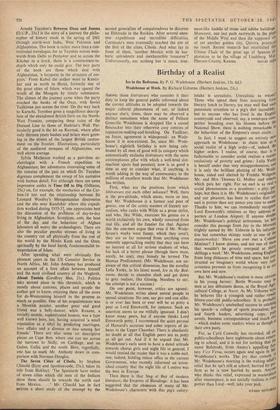Birthday of a Realist
AMONG those litterateurs who consider it their duty to keep the general public informed about the correct attitudes to be adopted towards the major cultural phenomena of our, or indeed anyone else's, times, there may be observed a distinct uneasiness when the name of Pelham Grenville Wodehouse is dropped like a casual firecracker into their otherwise cosy coteries of reputation-making-and-breaking. On Faulkner, on Joyce, agreement is widespread: on Wode- house it is non-existent. So, since Mr. Wode- house's eightieth birthday is now being cele- brated by all men of good will (a category which automatically excludes litterateurs with the same contemptuous phut with which a well-bred slot- machine ejects bad pennies), now is as good a time as any to consider what, if anything, is worth adding in the way of commentary to the millions of excellent words that Mr. Wodehouse has written.
First, what are the positions from which litterateurs eye each other askance? Well, there is the pro-attitude, which states, more or less. that Mr. Wodehouse is a fantast and poet of genius, one of the comic masters of literary sur- realism, who ranks with Wilde as a prose stylist, and who, like Wilde, exercises his genius on a world exclusively his own, wholly removed from real life, and all the funnier for that. Against this the con-men argue that even if Mr. Wade- house's works were funny, which they aren't, they are so far removed from anything even remotely approaching reality that they can have no interest at all for serious students of what, for lack of a better phrase (though there must, surely, be one), may loosely be termed The Human Predicament. (Mr. Wodehouse, not un- aware of this critical dissension, has the novelist Leila Yorke, in his latest novel, Ice in the Bed room. decide to abandon slush and get down to grey realism, like Gissing. Needless to say, the attempt is not a success.) On one point, however, critics are agreed: Mr. Wodehouse writes about unreal people in unreal situations. No one, say pro and con alike, is or ever has been or ever will be as potty a peer as Lord Emsworth, for instance. Such an assertion seems to me wilfully ignorant. I don't know many peers, but if anyone thinks Lord Emsworth potty, I recommend the quiet perusal of Hansard's accurate and sober reports of de- bates in the Upper Chamber. There is absolutely no doubt at all that English peers are as potty as all get out. And if it be argued that Mr. Wodehouse's earls seem to have a dated attitude towards chorus girls and night life in general, I would remind the reader that it was a noble earl, one, indeed, holding minor office in the current Government, who recently informed an aston- ished country that the night life of London was the best in Europe.
Then there is that Stag at Bay of modern literature, the Empress of Blandings: it has been suggested that the obsession of many of Mr. Wodehouse's characters with this pig's calory- intake is unrealistic. Unrealistic to who'll Those who spend their lives scurrying from literary lunch to literary tea may well find such passionate attention to a pig's diet incredible' but to anyone who has lived in the English countryside and observed, say, a sweet-pea corn' petitor brooding over his blooms before the
I National Show, there is nothing remarkable n the behaviour of the Empress's court circle.
In fact, I want to suggest an entirely new approach to Wodehouse: to claim him as
social realist of a high order—of, indeed, the higher orders. I realise, of course, that it 15 fashionable, to consider social realism a matter exclusively of poverty and grime: Leila Yorke is herself under that very misapprehension, and it is only the brilliant plotting of Mr. Wocle' house, aided and abetted by Freddie Widgeon' Mr. and Mrs. Thomas G. Molloy and others' which puts her right. For an earl is as real $ social phenomenon as a prostitute: a pity, ner haps, but there it is. Mr. Wodehouse's originality' and our pleasure, has been to realise that any earl is pottier than any ponce you care to naM!' Thanks to him, we can immediately recognise Lord Emsworth's relations as they address re' porters at London Airport. If anyone doubts Mr. Wodehouse's political seriousness, let him consider this passage from Joy in the morning (rightly named by Mr. Usborne in his inforroa tive but somewhat skimpy study as one of the masterworks): 'Have you ever met a Cabinet , Minister? I know dozens, and not one of the"' that wouldn't be grossly overpaid at thill shillings a week.' Mr. Wodehouse, seeing Engle) from long distances of time and space, has con, structed , structed an imaginary world whose very luul crousness prevents us from recognising it as on own here and now.
But Mr. Wodehouse's realism is most obvious in his young heroes: Bertie Wooster may be seen at any ddbutante dance, at the Royal Agri cultural College, at Ascot. As Mr. Usborne he behaves like a youngish and rather rovvo,Y., fifteen-year-old public-schoolboy. It is probably Mr. Wodehouse's unabashed success in catching his speech—a collage of sports journalese, first n and fourth leaders, advertising copy, PT; novels, business correspondence and much eis.1 —which makes some readers wince as though their own pasts. For, as Cyril Connolly has recorded, all e$: public-schoolboys have nightmares about return' ing to school, and it is not for nothing that the name Bulstrode, from Anstey's appalling C11
.,$,
tasy Vice Versa, occurs again and again in NJ; Wodehouse's works. The joy that cometh I, Mr. Wodehouse's morning is the waking adults
,
relief that he isn't still at school, harried by pre' fects as he is now harried by aunts. Anyone who thinks this relief, expressed in masterpiece after masterpiece, is not socially realistic is even pottier than Lord--well, take your pick.
JULIAN MITCIIE0






































 Previous page
Previous page